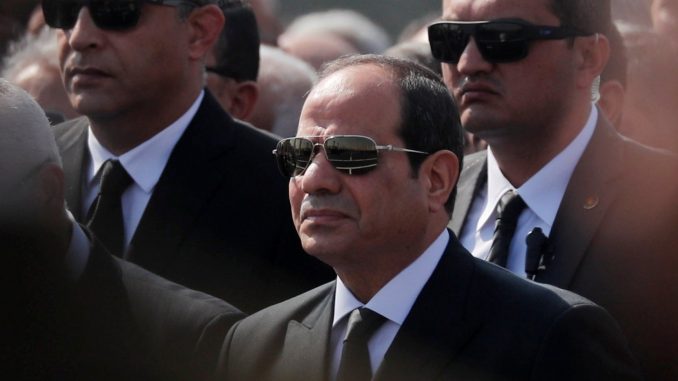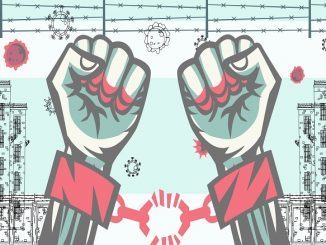
Amid a collapsing economy, self-interested regional powers and a hypocritical West, Egyptians have little reason for hope
The late Egyptian President Mohamed Morsi used to remind us that, unlike individuals who may have more than one life-defining opportunity in a lifetime, such opportunities come to nations only once in a generation, if that, stated Yehia Hamed, the former minister of youth in the government of late President Mohamed Morsi, in a recent piece that he published on Middle East Eye. Mr. Hamed continued his article as follows:
As we mark the tenth anniversary of the violent and bloody military coup that removed Morsi from office and ended democracy in Egypt, I am reminded of his warning.
This is not to say that change is now impossible in Egypt, but the likelihood of positive change is rapidly diminishing. Over the long arc of Egypt’s modern history, the years 2011-2013 were something of an exception to the rule.
Since 1952 – a period of more than 70 years, an entire generation’s lifetime – Egypt has been ruled by military strongmen. There have been mini power struggles over the years, notably between Gamal Abdel Nasser and Abdel Hakim Amer in the 1960s, and towards the beginning of Anwar Sadat’s reign, but those were themselves exceptions.
General Abdel Fattah al-Sisi’s rule is, in some ways, no different. But in other important ways, it is.
It has been said that “history repeats itself, the first time as tragedy, the second as farce”. We are definitely in that latter stage as far as Egypt goes. Sisi’s 10-year rule has thus far been marked by several important changes to the very nature of the country.
Egypt’s armed forces – long an important, but relatively independent, part of the power structure – have been brought to heel. Sisi has been able to rotate commanders at every level, sometimes with dizzying speed, and without any regard to law or constitutional safeguards.
In return, the military has been allowed or encouraged to swallow up the economy. Not only is the military now commanding shrimp and pasta production, it also controls most sectors of the economy. The only thing the military is not engaged in is the actual defence of the realm.
Recent images of Egyptian soldiers surrendering in Sudan sparked indignation and shock among Egyptians.
Existential threat
Sisi has also presided impotently over the single worst existential threat facing Egypt: the Grand Ethiopian Renaissance Dam. The dam’s impacts are now almost assured, and Egypt has no plans to meet those challenges.
In addition, the last 10 years have witnessed an explosion of debt and a run of mega-projects. But unlike the tragic period, this farcical one is marked by an absence of even any short-term benefits for people.
Instead of investing in people and safeguarding against threats like the Ethiopian dam, Sisi has focused on projects such as the new administrative capital. It is purported to have cost $59bn and stands in the desert like an “Ozymandian nightmare” – a monument to vanity, poor planning and indulgence. If ever there was a symbol of one-man rule, this is it.
Stories abound on the imbecility of the design of the new capital, not least of which involves the suffering of tens of thousands of government workers as they spend significant amounts of money on transportation to this folly in the desert.
The macroeconomic picture has never been worse. Egypt’s foreign debt is ballooning. Real incomes are shrinking because of both inflation and the uncertain valuation of the pound. Dollarisation has become a reality in some sectors, despite laws against it.
The government’s solution to these problems is to raid public and private coffers. The country’s most lucrative assets are being sold to finance the debt crisis. The impacts on everyday Egyptians have been incalculable, to the point that Sisi’s policies have been labelled a “war on the poor”. Yet it is not only the poor, but also the rapidly vanishing middle and middle-upper classes, that are suffering.
Egyptians with any hope of work abroad are responding with their feet: Egyptian doctors, for example, are “leaving in droves”.
The path ahead
This latter point is impossible to overemphasise. Predictions about the future are rooted in some extrapolation from the past, coupled with an assessment of the overall current state. But Egypt’s current circumstances are unprecedented, and so predictions about the future are difficult to make with any certainty.
The coup that brought Sisi to power was made possible through local support from the military and some elites; through regional powers who saw a democratic government, Islamist or otherwise, as a danger to their existence; and through the support of western governments, including the United States.
The coup, and indeed the past 10 years, have demonstrated to Egyptians that the West’s rhetoric on democracy and human rights is little more than an extension of an expansionist, dominating foreign policy. In the case of several European governments, it also seems to go beyond mere instrumental exploitation of resources to a more fundamental desire to keep Arab peoples under lock and key. And while that lesson has now been thoroughly absorbed by Egyptians, it is nevertheless a terrible reality for the world.
There are three possible paths out of the current dire situation. One is another military coup, which would cement the status of Egypt as inherently unstable and subject to the ambitions of the next officer who can prevail. Alternatively, the status quo could continue, with a slow descent into ungovernability.
The third path is for Egyptians to rediscover the spirit of 2011 and marshal a collective will to create an Egypt for all. This has become an ever-less-likely outcome, and even if it materialises, it will be at a great cost, and entail a long path – but it remains the best possible outcome.
Between a collapsing domestic situation, regional powers that seem intent on buying Egypt piece by piece, and western powers that have zero interest in democratisation, dignity or real human rights for the peoples of the Arab world, Egyptians are left with little, if any, hope.
A man without hope is a dangerous being, and while the future is difficult to predict with any degree of accuracy, all the possible hues of a likely future are shades of black. The window for any real stability for Egyptians is fast closing, if it’s not already closed. And apres cela, le deluge.



